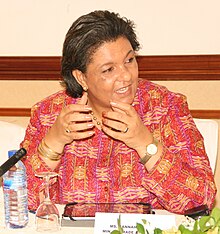
Back النساء في غانا Arabic ঘানাৰ নাৰী Assamese Mujer en Ghana Spanish زنان در غنا Persian Mata a Ghana Hausa Ụmụ nwanyị na Ghana IG
 | |
| General Statistics | |
|---|---|
| Maternal mortality (per 100,000) | 319 (2018) |
| Women in parliament | 13.5% (2017) |
| Women over 25 with secondary education | 45.7% (2010) |
| Women in labour force | 66.9% (2011) |
| Gender Inequality Index[1] | |
| Value | 0.529 (2021) |
| Rank | 130th out of 191 |
| Global Gender Gap Index[2] | |
| Value | 0.672 (2022) |
| Rank | 108th out of 146 |
| Part of a series on |
| Women in society |
|---|
 |
The status of women in Ghana and their roles in Ghanaian society has changed over the past few decades.[3] There has been a slow increase in the political participation of Ghanaian women throughout history.[4] Women are given equal rights under the Constitution of Ghana, yet disparities in education, employment, and health for women remain prevalent.[5][6] Additionally, women have much less access to resources than men in Ghana do.[6] Ghanaian women in rural and urban areas face slightly different challenges.[7] Throughout Ghana, female-headed households are increasing.[6]
Multiple forms of violence against women still exist in Ghana.[8] In recent years, feminist organizations and women's rights groups have increased.[8][9][4] Efforts to bring about gender equality continue to grow in Ghana. The government of Ghana has signed on to numerous international goals and conventions to enhance women's rights in Ghana.
- ^ "Human Development Report 2021/2022" (PDF). HUMAN DEVELOPMENT REPORTS. Retrieved 19 December 2022.
- ^ "Global Gender Gap Report 2022" (PDF). World Economic Forum. Retrieved 27 February 2023.
- ^ Cite error: The named reference
:2was invoked but never defined (see the help page). - ^ a b Apusigah, Agnes Atia; Adatuu, Roland (1 January 2017). "Enhancing Women's Political Fortunes in Ghana: Is a 50/50 Campaign Realistic?". Ghana Journal of Development Studies. 14 (2): 43–62. doi:10.4314/gjds.v14i2.3. ISSN 0855-6768.
- ^ Mahama, Tia Abdul-Kabiru; Nkegbe, Paul Kwame (2017-01-01). "Gender Preference in Primary School Enrolment among Households in Northern Region, Ghana". Ghana Journal of Development Studies. 14 (1): 60–78. doi:10.4314/gjds.v14i1.4. ISSN 0855-6768.
- ^ a b c Awumbila, Mariama (2006). "Gender equality and poverty in Ghana: implications for poverty reduction strategies". GeoJournal. 67 (2): 149–161. doi:10.1007/s10708-007-9042-7. JSTOR 41148110. S2CID 154300298.
- ^ Owusu Ashah & Agbemafle (2016). "Determinants of Domestic Violence Against Women in Ghana". BMC Public Health. 16: 368. doi:10.1186/s12889-016-3041-x. PMC 4852424. PMID 27139013.
- ^ a b Amoakohene, Margaret Ivy (2004-12-01). "Violence against women in Ghana: a look at women's perceptions and review of policy and social responses". Social Science & Medicine. 59 (11): 2373–2385. doi:10.1016/j.socscimed.2004.04.001. ISSN 0277-9536. PMID 15450710.
- ^ Lawrance, Benjamin N. (2010). "From Child Labor "Problem" to Human Trafficking "Crisis": Child Advocacy and Anti-Trafficking Legislation in Ghana". International Labor and Working-Class History. 78 (1): 63–88. doi:10.1017/S0147547910000128. JSTOR 40931304. S2CID 144578193.